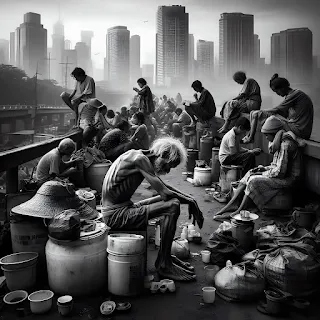How Economic Policies Can Lift Millions Out of Poverty
Poverty remains one of the most pressing issues globally, affecting billions of people and hindering sustainable development. Despite significant progress in some areas, the economic divide continues to widen, leaving many without access to basic necessities. Effective economic policies play a crucial role in alleviating poverty by fostering inclusive growth, creating jobs, and ensuring access to essential services. This blog post explores how targeted economic policies can lift millions out of poverty, examining various strategies that have proven effective in different contexts.
#Poverty
Poverty is a multidimensional issue that encompasses not only a lack of income but also limited access to education, healthcare, clean water, sanitation, and other basic services. It affects individuals and families, depriving them of opportunities and perpetuating cycles of disadvantage. To effectively combat poverty, economic policies must address its root causes and create an environment that fosters growth and opportunity.
Key Economic Policies for Poverty Alleviation
1. Inclusive Economic Growth
- Promoting Sustainable Development: Economic growth must be inclusive, ensuring that benefits are shared among all segments of society. Policies that focus on sustainable development, such as promoting green technologies and renewable energy, can create jobs while protecting the environment.
- Supporting Small and Medium Enterprises (SMEs): SMEs are vital for job creation and economic diversification. Providing access to credit, training, and markets can empower these businesses, driving local economic growth and reducing poverty.
2. Social Safety Nets
- Implementing Cash Transfer Programs: Direct cash transfers or conditional cash transfers can provide immediate financial support to low-income families, improving their standard of living and allowing them to invest in education and healthcare.
- Developing Unemployment Benefits: Unemployment benefits can help individuals and families cope during economic downturns, preventing them from falling into poverty while they seek new employment opportunities.
3. Access to Education and Skills Development
- Investing in Education: Quality education is essential for breaking the cycle of poverty. Governments should invest in primary, secondary, and vocational education to equip individuals with the skills needed for the job market.
- Promoting Lifelong Learning: Policies that encourage lifelong learning and skills training can help individuals adapt to changing economic conditions and increase their employability.
4. Healthcare Access
- Universal Healthcare Coverage: Providing access to affordable healthcare can prevent medical expenses from pushing families into poverty. Investing in healthcare infrastructure and services ensures that all individuals can receive necessary medical care.
- Preventive Health Programs: Implementing preventive health programs can reduce the burden of disease, leading to a healthier workforce and lower healthcare costs in the long run.
5. Infrastructure Development
- Improving Transportation and Connectivity: Investments in transportation infrastructure, such as roads and public transit, can enhance access to markets, education, and healthcare, promoting economic opportunities for underserved populations.
- Enhancing Digital Infrastructure: Expanding internet access and digital services can open up new economic opportunities, particularly in rural areas, enabling individuals to participate in the digital economy.
6. Labor Market Policies
- Raising Minimum Wages: Establishing a living wage can help lift individuals and families above the poverty line, improving their quality of life and stimulating local economies through increased spending.
- Promoting Workers’ Rights: Ensuring fair labor practices, including the right to organize and collectively bargain, can empower workers and enhance job security, contributing to poverty reduction.
7. Targeted Support for Vulnerable Groups
- Empowering Women and Girls: Economic policies that focus on gender equality, such as access to education, healthcare, and financial services, can significantly impact poverty reduction. Empowered women contribute to economic growth and community development.
- Supporting Marginalized Communities: Targeted policies that address the needs of marginalized groups, including ethnic minorities and people with disabilities, can help reduce disparities and promote inclusive development.
8. Taxation and Redistribution Policies
- Progressive Taxation: Implementing a progressive tax system can ensure that wealthier individuals and corporations contribute their fair share to society. This revenue can be reinvested in social programs that benefit low-income communities.
- Public Investment in Social Programs: Redirecting funds from tax revenues into social programs, such as education, healthcare, and housing, can create a safety net that lifts individuals out of poverty.
Case Studies of Successful Economic Policies
1. Brazil's Bolsa Família Program
Brazil’s Bolsa Família program is a cash transfer initiative that provides financial support to low-income families conditional upon their children attending school and receiving vaccinations. This program has lifted millions out of poverty by improving access to education and healthcare, reducing inequality, and enhancing living standards.
2. Rwanda's Economic Transformation
Rwanda has implemented several economic policies aimed at poverty reduction, including investments in education, healthcare, and infrastructure. The government has focused on promoting agricultural productivity and supporting SMEs, leading to significant economic growth and a reduction in poverty rates.
3. Microfinance Initiatives in Bangladesh
Microfinance programs in Bangladesh, such as those established by Grameen Bank, provide small loans to low-income individuals, particularly women, to start their businesses. These initiatives have empowered millions, fostering entrepreneurship and lifting families out of poverty.
Economic policies have the potential to play a transformative role in lifting millions out of poverty. By focusing on inclusive growth, social safety nets, education, healthcare, infrastructure, and targeted support for vulnerable groups, governments can create an environment that fosters opportunity and resilience. Implementing effective policies requires collaboration among governments, civil society, and the private sector, ensuring that efforts are sustained and impactful. As the world continues to grapple with the challenges of poverty, a concerted commitment to effective economic policies can pave the way for a brighter, more equitable future for all.
